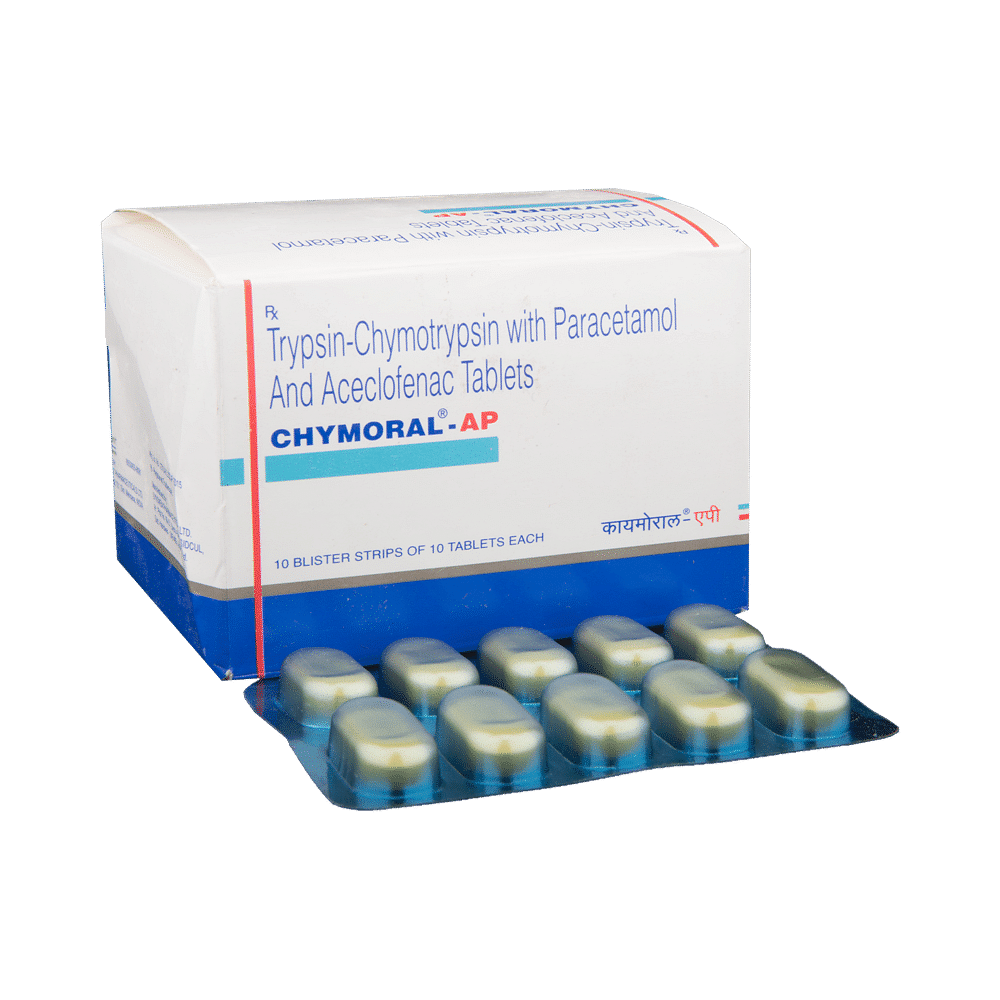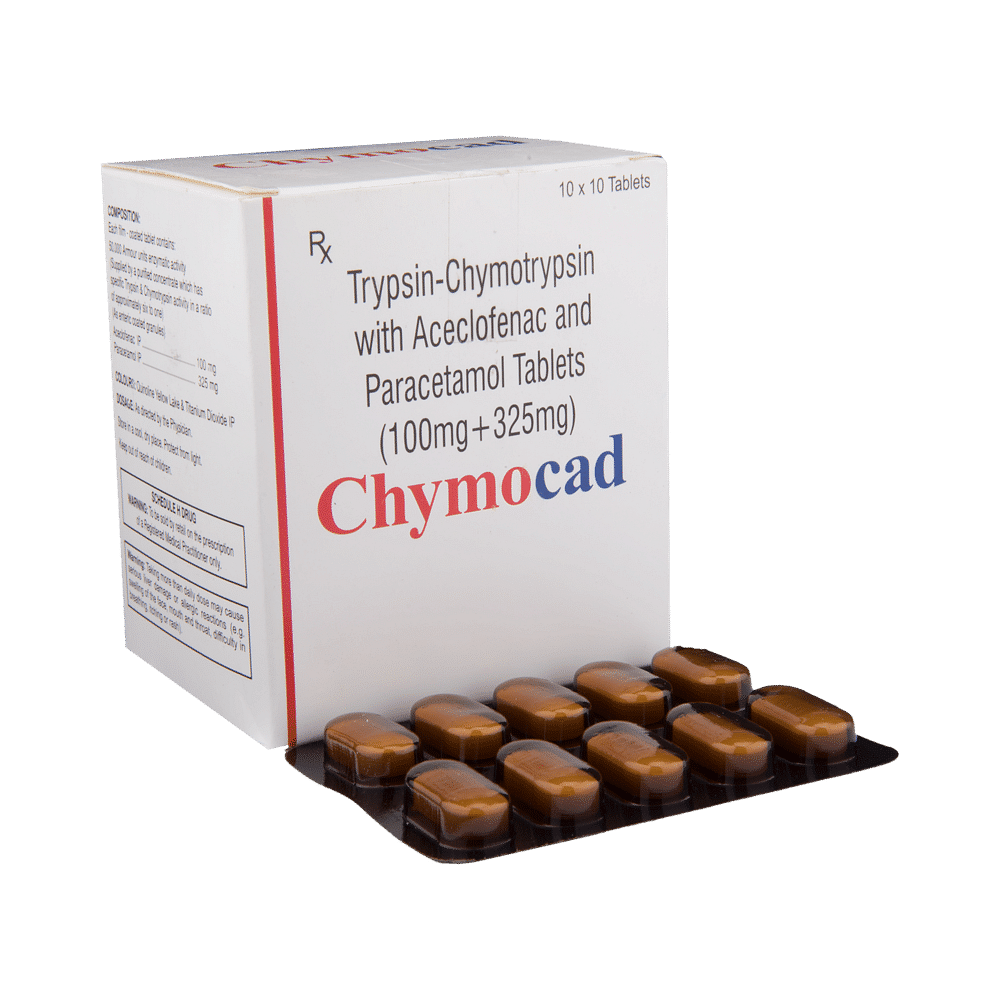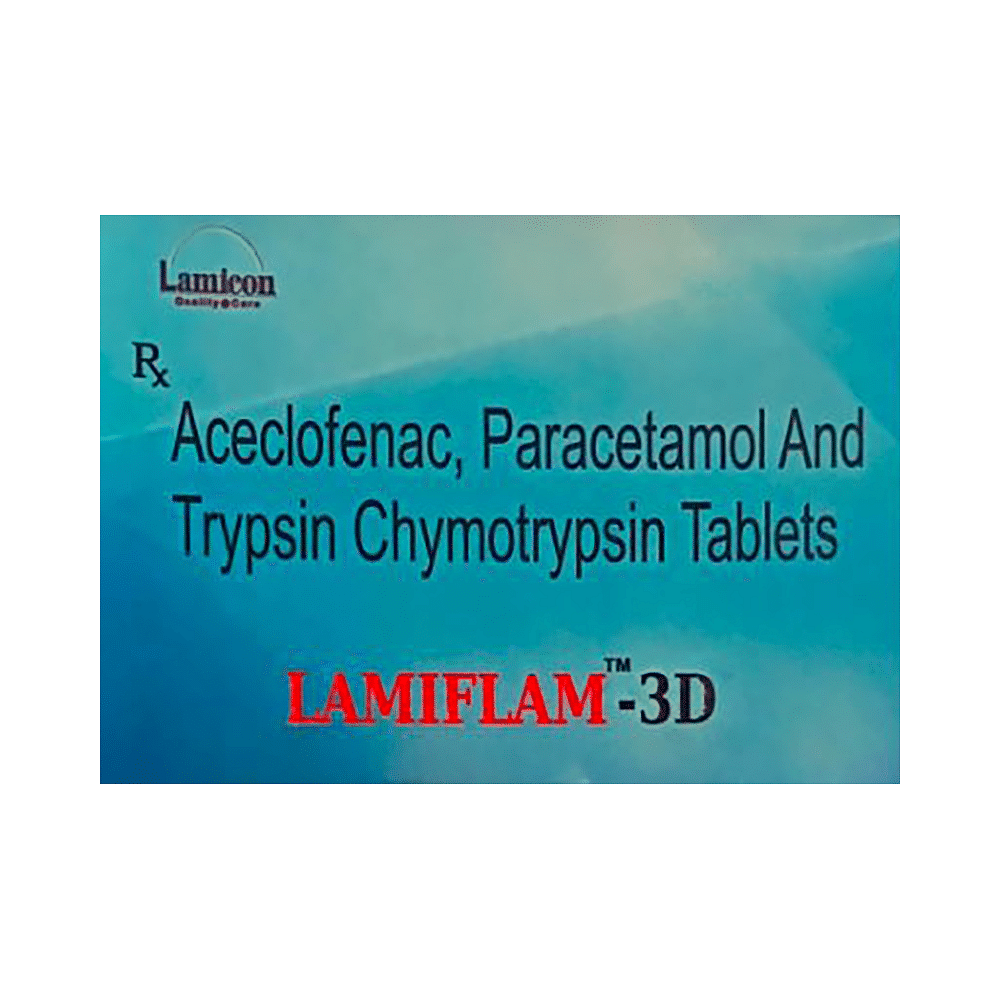
Chymosoft AP 100mg/325mg Tablet
Manufacturer
Olamic Healthcare
Salt Composition
Aceclofenac (100mg) + Paracetamol (325mg) + Trypsin Chymotrypsin (50000AU)
Key Information
Short Description
Chymosoft AP 100mg/325mg Tablet is a pain relieving medicine used to treat pain and inflammation in conditions like rheumatoid arthritis, ankylosing spondylitis, and osteoarthritis.
Dosage Form
Tablet
Introduction
Chymosoft AP 100mg/325mg Tablet should be taken with food. The dose and duration will depend on what you are taking it for and how well it helps your symptoms. You should take it as advised by your doctor. Do not take more or use it for longer duration than recommended by the doctor. The most common side effects of this medicine include nausea, vomiting, heartburn, stomach pain, and indigestion. If any of these side effects do not resolve with time or get worse, you should let your doctor know. Your doctor may be able to suggest ways of preventing or reducing them.
Directions for Use
Take this medicine in the dose and duration as advised by your doctor. Swallow it as a whole. Do not chew, crush or break it. Chymosoft AP 100mg/325mg Tablet is to be taken with food.
Safety Information
Side Effects
Nausea Vomiting Heartburn Stomach pain Indigestion
Alcohol Warning
It is unsafe to consume alcohol with Chymosoft AP 100mg/325mg Tablet.
Breastfeeding Warning
Information regarding the use of Chymosoft AP 100mg/325mg Tablet during breastfeeding is not available. Please consult your doctor.
Pregnancy Warning
Chymosoft AP 100mg/325mg Tablet may be unsafe to use during pregnancy. Although there are limited studies in humans, animal studies have shown harmful effects on the developing baby. Your doctor will weigh the benefits and any potential risks before prescribing it to you. Please consult your doctor.
Interacting Medicines
Drugs for pain/fever or cough-and-cold
How it works
Chymosoft AP 100mg/325mg Tablet is a combination of three medicines: Aceclofenac, Paracetamol and Trypsin Chymotrypsin. Aceclofenac is a non-steroidal anti-inflammatory drug (NSAID) and Paracetamol is an antipyretic (fever reducer). They work by blocking the release of certain chemical messengers in the brain that cause pain and fever. Trypsin Chymotrypsin is a combination of enzymes which break down proteins into smaller fragments thereby making them available for absorption into the blood. Once absorbed, they increase blood supply in the affected area and reduce swelling.
Quick Tips
Take it with food to avoid getting an upset stomach It may cause dizziness and sleepiness. Don't drive or do anything that requires mental focus until you know how it affects you Avoid consuming alcohol when taking Chymosoft AP 100mg/325mg Tablet as it may cause excessive drowsiness and increase the risk of liver damage Do not take it with any other medicine containing acetaminophen (drugs for pain/fever or cough-and-cold) without asking your doctor first
Related Medicines

Chymoral-AP Tablet

Chymocad Tablet

Lamiflam 3D Tablet

Healozen-AP Tablet

Acipact-XL Tablet

Novaheyl Forte 100mg/325mg Tablet

Aclotem-Forte Tablet

Dazheyl Forte 100mg/325mg Tablet

Acelimb Plus Tablet

Soldase Plus 100mg/325mg Tablet
Frequently asked questions
What is Chymosoft AP 100mg/325mg Tablet?
Chymosoft AP 100mg/325mg Tablet is a combination medicine that contains Aceclofenac, Paracetamol, Trypsin, and Chymotrypsin. It helps to relieve pain and swelling by reducing the levels of chemical substances in the body.
Can I get addicted to Chymosoft AP 100mg/325mg Tablet?
No, there is no reported risk of addiction with Chymosoft AP 100mg/325mg Tablet. However, it's essential to use this medicine as directed by your doctor and follow their guidance on its use.
Can I stop taking Chymosoft AP 100mg/325mg Tablet when my pain is relieved?
Chymosoft AP 100mg/325mg Tablet should be used for a short term, unless your doctor advises you otherwise. If your pain is relieved, you can usually discontinue the medicine. However, if your doctor has recommended continuing the treatment, it's crucial to follow their advice.
Can the use of Chymosoft AP 100mg/325mg Tablet cause dizziness?
Yes, some patients may experience dizziness or lightheadedness when taking Chymosoft AP 100mg/325mg Tablet. If you feel dizzy, it's recommended to rest for a while and resume your normal activities once you feel better.
Can the use of Chymosoft AP 100mg/325mg Tablet cause damage to kidneys?
Long-term use of Chymosoft AP 100mg/325mg Tablet may lead to kidney damage. This is because the medicine reduces prostaglandins, which protect the kidneys from harm. People with pre-existing kidney disease should consult their doctor before using this medicine.
Can the use of Chymosoft AP 100mg/325mg Tablet cause damage to liver?
Chymosoft AP 100mg/325mg Tablet contains Paracetamol, which can be harmful to the liver in high doses. To minimize the risk of liver damage, it's essential to follow the recommended dosage and avoid drinking alcohol while taking this medicine. Patients with underlying liver disease should consult their doctor before using Chymosoft AP 100mg/325mg Tablet.
How long will Chymosoft AP 100mg/325mg Tablet take to act?
It may take around an hour for the initial pain-relieving effects of Chymosoft AP 100mg/325mg Tablet to be noticed after taking the medicine.
What if I forget to take Chymosoft AP 100mg/325mg Tablet?
If you miss a dose, skip it and take your next scheduled dose. Do not double the dose or take it at a different time to make up for the missed dose. If unsure, consult your doctor for guidance.
Will a higher than the recommended dose of Chymosoft AP 100mg/325mg Tablet be more effective?
Taking a higher dose of Chymosoft AP 100mg/325mg Tablet will not increase its effectiveness but may lead to unwanted side effects and toxicity. If your symptoms persist or worsen, consult your doctor for re-evaluation.
Are there any specific contraindications associated with the use of Chymosoft AP 100mg/325mg Tablet?
Chymosoft AP 100mg/325mg Tablet is not recommended for patients with a known allergy to its components or excipients. It should also be avoided in patients with a history of stomach ulcers, heart failure, high blood pressure, liver disease, and kidney disease.


